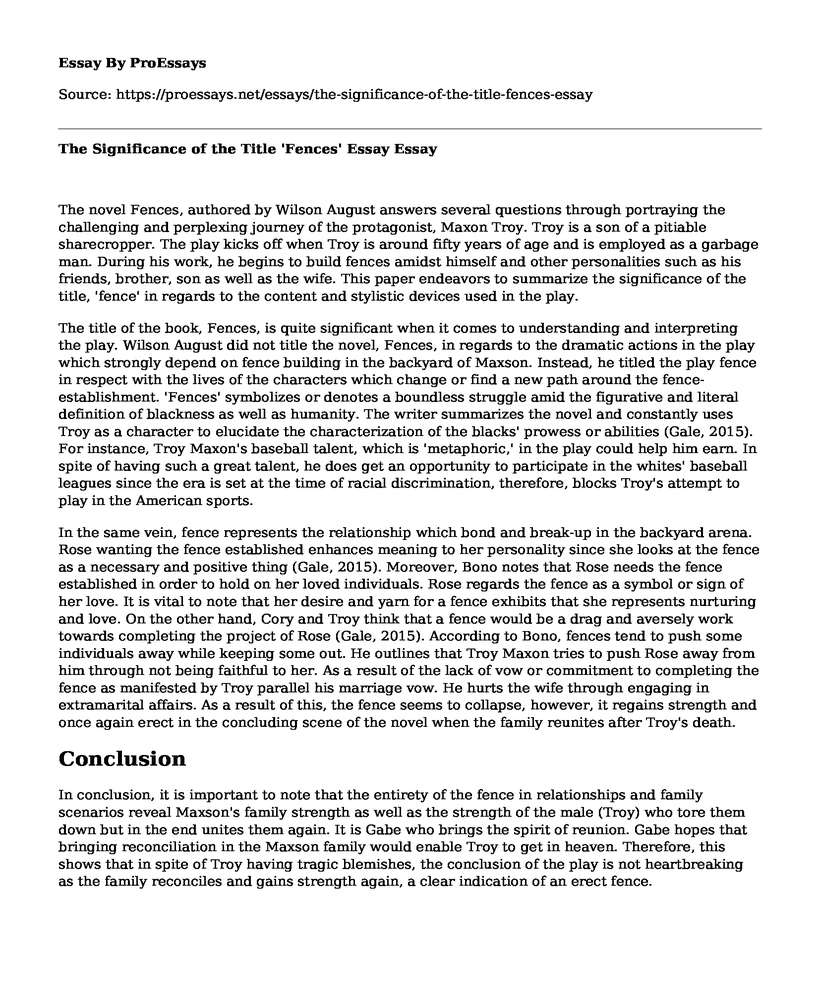The novel Fences, authored by Wilson August answers several questions through portraying the challenging and perplexing journey of the protagonist, Maxon Troy. Troy is a son of a pitiable sharecropper. The play kicks off when Troy is around fifty years of age and is employed as a garbage man. During his work, he begins to build fences amidst himself and other personalities such as his friends, brother, son as well as the wife. This paper endeavors to summarize the significance of the title, 'fence' in regards to the content and stylistic devices used in the play.
The title of the book, Fences, is quite significant when it comes to understanding and interpreting the play. Wilson August did not title the novel, Fences, in regards to the dramatic actions in the play which strongly depend on fence building in the backyard of Maxson. Instead, he titled the play fence in respect with the lives of the characters which change or find a new path around the fence-establishment. 'Fences' symbolizes or denotes a boundless struggle amid the figurative and literal definition of blackness as well as humanity. The writer summarizes the novel and constantly uses Troy as a character to elucidate the characterization of the blacks' prowess or abilities (Gale, 2015). For instance, Troy Maxon's baseball talent, which is 'metaphoric,' in the play could help him earn. In spite of having such a great talent, he does get an opportunity to participate in the whites' baseball leagues since the era is set at the time of racial discrimination, therefore, blocks Troy's attempt to play in the American sports.
In the same vein, fence represents the relationship which bond and break-up in the backyard arena. Rose wanting the fence established enhances meaning to her personality since she looks at the fence as a necessary and positive thing (Gale, 2015). Moreover, Bono notes that Rose needs the fence established in order to hold on her loved individuals. Rose regards the fence as a symbol or sign of her love. It is vital to note that her desire and yarn for a fence exhibits that she represents nurturing and love. On the other hand, Cory and Troy think that a fence would be a drag and aversely work towards completing the project of Rose (Gale, 2015). According to Bono, fences tend to push some individuals away while keeping some out. He outlines that Troy Maxon tries to push Rose away from him through not being faithful to her. As a result of the lack of vow or commitment to completing the fence as manifested by Troy parallel his marriage vow. He hurts the wife through engaging in extramarital affairs. As a result of this, the fence seems to collapse, however, it regains strength and once again erect in the concluding scene of the novel when the family reunites after Troy's death.Conclusion
In conclusion, it is important to note that the entirety of the fence in relationships and family scenarios reveal Maxson's family strength as well as the strength of the male (Troy) who tore them down but in the end unites them again. It is Gabe who brings the spirit of reunion. Gabe hopes that bringing reconciliation in the Maxson family would enable Troy to get in heaven. Therefore, this shows that in spite of Troy having tragic blemishes, the conclusion of the play is not heartbreaking as the family reconciles and gains strength again, a clear indication of an erect fence.
Reference
Gale, C. L. (2015). A Study Guide for August Wilson's Fences. Gale, Cengage Learning.
Cite this page
The Significance of the Title 'Fences' Essay. (2022, Mar 28). Retrieved from https://proessays.net/essays/the-significance-of-the-title-fences-essay
If you are the original author of this essay and no longer wish to have it published on the ProEssays website, please click below to request its removal:
- Of Mice and Men Essay - True Friendship Issue in a Literary Essay Example
- The Heart of Darkness Literary Analysis
- Tom Jones Novel Essay
- Paper Example on Communication Models: Mythology Theory
- Essay Sample on Brave New World: Consider the "Savages"
- The Story of an Hour by Kate Chopin Essay Example
- Fate in The Iliad: Women & War Prizes - Essay Sample







